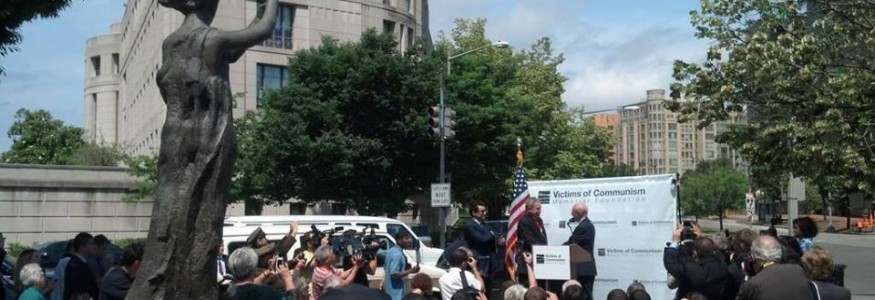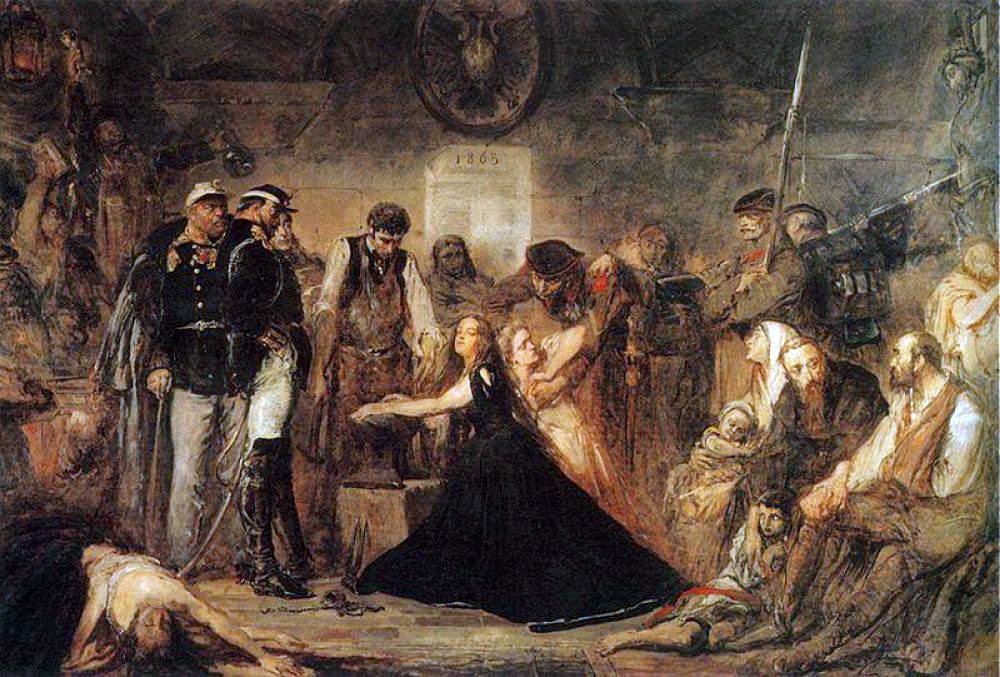Myroslav Marynovych, speaking at the ceremony of the Truman–Reagan Award,
Washington DC, June 11, 2014
Distingushed Guests,
First of all let me thank once again, in your presence, the Victims of Communism Memorial Foundation for awarding me the Truman–Reagan Medal of Freedom. It’s a true honor for me and for many of my fellow Ukrainians.
Let me further develop some ideas expressed during my earlier Acceptance speech.
As you already know, I had been a prisoner of conscience (as Amnesty International puts it), imprisoned from 1977 to 1987 for human rights activities in the former Soviet Union. The time in the Soviet GULAG happened to be the most difficult, but, at the same time, the most spiritually rewarding in my life.
And now it seems to me the world is still searching for a solution to a huge dilemma unresoled in the past. Safety versus Values is still the issue for mankind – especially in the field of European security and the memory of communist crimes. Ukraine striving for such values as freedom, truth, and dignity, happened to become, in a sense, a hostage of the world system of security. So for Ukraine this is ultimately a vital problem.
Let me analyse legal and moral aspects of the non-condemnation of communist crimes and draw some conclusions.
(1) European Security and the Legal Condemnation of Communist Crimes
Undoing the mental and moral degradation brought about by communism has turned out to be a much more difficult task than dismantling the Soviet Union. This is valid for all the post-Soviet countries, including Ukraine. In particular, the task of establishing rule of law happened to be more difficult than expected.
Twenty years ago, political prisoners who came out of detention did not strive to have their persecutors put on trial. The desire to “turn a new page” was overwhelming: we leave you alone, you help us build democracy. It was a kind of social contract that turned out to be one-sided. We all had to learn that an evil deed becomes part of the past only when it has been condemned and repented of. Unrepented wrongdoing inevitably serves as a source of new problems.
In the early 1990s, the communist elite changed its flag but not its essence. The lack of condemnation and repentance for the evils committed led to further evils during the next governments. This has had a profoundly destructive effect on the people’s faith in the possibility of the establishment and rule of justice.
In non-condemnation of the communist past, our Western partners were also inconsistent. For instance, while Germany did not hesitate to make Honeckerpay for his crimes, Ukraine heard little from the West besides warnings against starting a “second Nuremberg” and putting the leaders of the communist regime on trial. Why? Because Europe did not want to have more problems with Russia. Cajoling Moscow seemed to be more important than taking communist crimes as seriously as Nazi ones.
Europe has always treated both totalitarianisms differently: the Nazi regime was considered to be an absolute evil while the communist regime looked like the Slavonic spoiling of an excellent idea.
As a result, the West prefered not to notice the dangerous developments in the post-communist space. It didn’t pay attention to the fact that, more and more, Russia’s wounded honor had become increasingly reminiscent of the wounded honor of Nazi Germany, humiliated by the 1920 Treaty of Versailles. The West was not alarmed by the fact that the old Nazi doctrine of “protecting our compatriots in foreign lands” had gained power in Moscow.
The West underestimated the meaning of the Russian war in Georgia and turned the blind eye to the Russian ban for any further movement of Ukraine toward the EU and NATO imposed at the 2008 Bucharest summit. Russia’s claims to control the post-Soviet space seemed to be legitimate. No wonder that Putin considered the idea of restoration of the former Soviet Union to be legitimate, too.
Thusitwas a wrong idea to let the communist evils not be crimilalized. The crisis in Ukrainian-Russian relations is a logical consequence of that – undermining the whole system of international relations. This loses the main lesson of World War II: those who renounce the protection of values for the sake of their own safety, will inevitably pay with this safety for the renewal of the fundamental values of human civilization.
(2) European Security and the Moral Condemnation of Communist Crimes
There is an important ethical dimention of this failure, too.
The Yalta plan for security ignored the fact that there were two dancers in the mad tango of September 1939 – Hitler’s Germany and Stalin’s USSR. Avoiding mentioning this to please the victor became one of the biggest falsifications of the 20th century with enormous moral losses.
The 1945 Yalta agreement gave birth to crying injustice, I mean the double standard of evaluating the crimes of totalitarian systems: Nazi crimes were publicly condemned; communist crimes were covered by security imperatives and taken out of an ethical evaluation. The European official memory became one-sided with Nazi Germany as an absolute evil and the communist Soviet Union as a victorious good with some occasional dark spots on its shining garments.
As a result, the world heard the pain of victims of the Gestapo and didn’t hear that of the victims of KGB. It ended in a historical irony: apocalyptic evil assumed the appearance of salvific good. Now, this unrecognized evil is turning into the seed of a new worldwide conflict initiated by Putin’s Russia.
Therefore, the moral equation of Nazism and communism is, from my point of view, absolutely justified and even necessary.
The forgotten evils of communism dwell in the European consciousness, and for as long as they have not been admitted and repented of, any hope of mutual understanding among Europe’s people are futile. The spiritual unity of Europe is possible if we respect the pain of each other. That’s why reevaluating Europe’s historical memory in an ethical sense, also, is a sin equanon for the successful realization of any civilization-wide projects.
(3) Conclusions
Timothy Snyder suggests that national historiographies are too narrow and too limited to provide a valid framework for evaluating the history of World War II. We have to develop its supra-national vision.
I would say something similar for an ethical approach. To have a valid ethical framework for evaluation of both totalitarianisms, we need to go above national binary frameworks. It is totalitarianism itself to be the main aggressor in the 20th century.
The world has to grasp also that consensus in military and energy security cannot be reached until there is a consensus about the just reckoning with the communist crimes – legally and ethically.
Does it mean that Europe has to be transformed into one big court ground full of hatred and mutual blamings?
I see the following solutions for this dilemma:
- The evils of communism naturally call for a trial and communist actions have to be criminalized in a due process. However, the most important outcome of this trial would not be for the evildoers to be punished, but for the nature of the evil to be brought to light and clarified. Specifically this requires systematic study and a plan of action to clarify this evil. It is vitally important to make sure that the illusions and temptations that led to the sin of communism are properly understood as this has been done with respect to the sin of Nazism.
- It’s clear for me that Putin’s regime in Russia is the first one to be thoroughly judged for its restoration of old communist evils. However, communist “demons” (Dostoyevski) have been found among all the peoples of the Russian empire, including Ukrainians; the blame for the evils of communism truly falls on them all. From this point of view, Russia is no less a victim of communism than other peoples, and the cruelty with which the bolsheviks robbed her nobles and humiliated her nuns was no less apocalyptic.
However, being a victim does not automatically absolve one of guilt; the German people were one of the greatest victims of Nazism, but they accepted the blame and were forgiven and cleansed. This is the work all post-communist nations have to do – Russia to be the first of them – to jointly confess their guilt in worshipping the communist beast. Western Europe too must undergo a cathartic experience of this nature, as its fascination with communism nourished and legitimized the apocalyptic beast in the eastern nations.
- In the post-communist world, all the nations see themselves as the victims and not the perpetrators of communism. That’s why nobody wants to repent for its evils. But do these groups understand correctly the rights and responsibilities of being a victim? To issue an accusing verdict against communism is only half the battle. Truth is a necessary, but not the only precondition for reconciliation. The other one is forgiveness, and only the victim can forgive; the perpetrator by definition cannot do that. This is a great moral responsibility, without which there can be no true victory over communism.
Forgetting communist crimes has put the world at the edge of the new Cold War. On the contrary, we may transform the former Bloodlands into the place of True Reconciliation with joint accusations of crimes of communism, joint confession of our common guilt in worshipping it, and joint forgiveness of one another for all wrongs done.
Archbishop Desmond Tutu reminds us that the process of forgiveness requires acknowledgment on the part of the perpetrators that they have committed an offense. And he adds: “To forgive is not just to be altruistic; it is the best form of self interest”.



